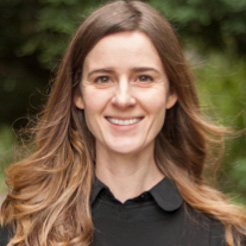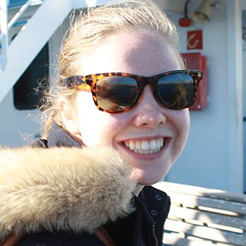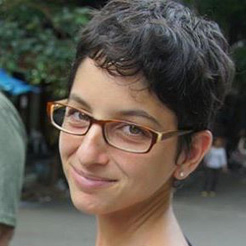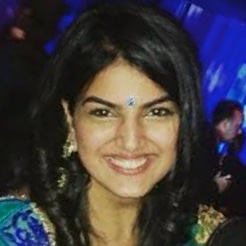Alumni Profiles
Contact
Human Rights and Humanitarianism Chloe Poynton, 2006 (Majors: Anthropology; International Studies; Concentration: Human Rights and Humanitarianism – before it was officially a concentration!).
Chloe Poynton, 2006 (Majors: Anthropology; International Studies; Concentration: Human Rights and Humanitarianism – before it was officially a concentration!).
After Graduation: Immediately after graduation, I accepted a Watson Fellowship. During my fellowship, I spent a year in refugee camps around the world interviewing refugees and aid workers about their experiences. After the fellowship, I accepted a position as an Electoral Advisor with the UN Development Programme in Sierra Leone.
I recently co-founded a business and human rights consulting firm, Article One. Article One works with companies, institutions, and state agencies, helping our clients develop and implement strategies to promote respect for human rights. Specifically, we advise our clients on how to align with the UN Guiding Principles on Business and Human Rights – a set of standards which outline the state’s ultimate duty to protect its citizens from corporate human rights abuses and business’s responsibility to respect the human rights of those it may impact. Examples of the types of projects we work on include conducting a human and child rights impact assessment of the tourism industry in Mexico, advising apparel companies on promoting labor rights in their supply chains, and partnering with technology companies on advancing the right to privacy.
Reflections on the Human Rights and Humanitarianism Concentration: The Concentration provided a deep grounding in international human rights theory and solidified my commitment to advance the realization of human rights globally. Interestingly, I use the International Bill of Rights (the UDHR, ICCPR and ICESCR) every day and regularly refer back to a text assigned in Professor Nedelsky’s course.
Advice to Current Students in the HRH Program: Be flexible. When I left Macalester, I never imagined I would work with business on human rights issues! However, after years of working at the UN and with NGOs, I realized I craved project-based work that was not contingent on grant applications. Had I not been willing to adjust my expectations and investigate alternate routes to promoting human rights, I would never have co-founded my own firm and felt the impact of my work so strongly.
 Anne Gavin, 2015 (Major: Anthropology, Minor: Political Science, Concentrations: Human Rights and Humanitarianism; Community and Global Health)
Anne Gavin, 2015 (Major: Anthropology, Minor: Political Science, Concentrations: Human Rights and Humanitarianism; Community and Global Health)
After Graduation: I was very fortunate to receive a Fulbright Schuman European Union Grant after graduation to research Asylum Policy in the European Union. Then, only a few months after I was awarded the grant, Europe experienced its greatest influx of asylum seekers reportedly since World War II. As a result, I’ve been combining my grant and HRH training to research the management (or mismanagement) of this migration period both in policy and practice. I’m looking more specifically at how the gap between European policy and its implementation in practice have let to moment of humanitarian innovation and identifying best practices that could be applied to future crises.
Reflections on the Human Rights and Humanitarianism Concentration: The greatest advantage to the concentrations at Macalester in my opinion are the practical training components and the HRH concentration might be one of the best in the regard. As an HRH concentrator, I attended a statewide refugee response simulation, interviewed leading practitioners in the field, conducted class research on best practices for an international organization, and more. I’m drawing upon each of these experiences every day on my Fulbright grant and wouldn’t be nearly as effective of a researcher without them. I have no doubt that I’ll continue to draw upon these experiences and more in my future work as well. Thank you HRH!
Advice to Current Students in the HRH Program: Take the Senior Seminar! HRH students are really an inspiring group of people and it was such a privilege to spend part of my senior year gathered around a table together, drinking Chai, discussing current events, and forming as support system as we prepared to leave the “Macalester Bubble.” Your peers are an incredible resource and it would be a shame to miss out on this because of senior-year stress!

Rebecca Sheff, 2009 (Major: Political Science, Concentrations: African Studies; Human Rights and Humanitarianism)
After Graduation: I worked as a legislative program assistant in DC for a year with the Friends Committee on National Legislation, lobbying on immigration reform. Then I worked in Zimbabwe as a program development intern at a torture treatment center. In 2011, I moved to Burundi and became a program manager for an LGBT rights and protection program with Heartland Alliance. In 2012 I started NYU School of Law, and graduated in 2015. During law school I worked with asylum seekers and on rights-based projects in India and Haiti.
I currently work as a legal fellow at Human Rights First, in DC. My work covers two programs: one on support for human rights defenders, and the other on countering antisemitism and extremism in Europe.
Reflections on the Human Rights and Humanitarianism Concentration: It helped me think critically about the humanitarian impulse, to be wary of unintended consequences, to understand the progressive development of international legal frameworks, and to prioritize the autonomy and dignity of those affected by conflict. It also helped me get to know other students who have gone on to do remarkable work as alumni.
Advice to Current Students in the HRH Program: Don’t worry too much about landing your dream job right after college. Get out there and get a bunch of different kinds of work experiences to see what you like and don’t like, whether you’re better suited to working domestically or abroad, and what level of change (structural/individual, global/regional/local, etc) you enjoy striving for.
 Shiveta Vaid, 2010 (Majors: Political Science; Economics, Concentration: Human Rights and Humanitarianism)
Shiveta Vaid, 2010 (Majors: Political Science; Economics, Concentration: Human Rights and Humanitarianism)
After Graduation: I worked at the Advocates for Human Rights as an intern in their Women’s Rights Program for about 8 months. After that, I moved home to St. Louis for about 2.5 years working at a medical practice as their marketing and outreach coordinator. I helped them set up a partnership with a domestic violence organization, providing information in our office waiting room, serving as a cell phone donation drop-off location, and sponsoring quarterly drives to gather supplies for survivors.
I’m currently pursuing a joint degree in Law and Bioethics (J.D./M.A.), with concentrations in health law and international human rights law. I’ve been fortunate to work with some really fantastic scholars and organizations in human rights and health law, including doing research with professors and working as a teaching assistant.
Reflections on the Human Rights and Humanitarianism Concentration: The HRH concentration gave me a concrete academic background to demonstrate that I was committed to learning about and eventually working in human rights law. The interdisciplinary program and fantastic range of classes allowed me to really explore the connection between health and human rights, which in turn gave me the tools to infuse my post-college job with that service ethos, even though it wasn’t a “traditional” human rights job. I also entered both my degrees prepared to take on more advanced topics, and am able to bring a broader perspective to my classes and work beyond just law and medicine.
Advice to Current Students in the HRH Program: You can use this concentration in a number of creative ways that might not be obvious right now, even in “non-human rights” fields. It’s a matter of identifying how you can bring your background into your post-college life, whether that’s proposing new programs or charity events, volunteer work, or eventually serving on a board. The human rights/humanitarianism world benefits greatly from people with diverse backgrounds – if you’re interested in seemingly unrelated work, pursue it. You will be a greater asset for broadening your horizons. Keep in touch with your professors – they’re some of the best advocates and mentors you’ll have in your corner as you go out into the world, and also remind you of what you care about when your life takes unexpected turns. Lastly, focus on excelling at whatever skills are required at your post-college jobs – you’d be surprised how much satisfaction you’ll derive from doing so, and how well employers (current and future!) respond to that sort of drive.